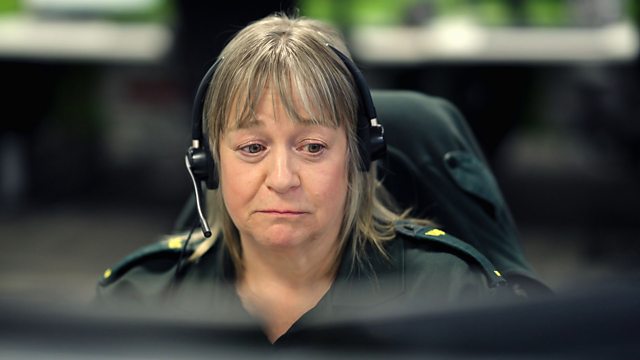
Critical care paramedic Nick is dispatched to a 78-year-old man who was found collapsed at home. Surrounded by the patient’s family, Nick must deliver some heartbreaking news.
Specialist paramedics are dispatched to a 78-year-old man in cardiac arrest who was found collapsed at home. As the team fight to give Ken the best chance of survival, Nick leads the paramedic crews as they attempt to restart Ken’s heart. But as minutes of CPR pass, it becomes clear, despite their best efforts, that Ken is not going to survive.
Nick speaks to Ken’s wife of 58 years, Kath, and after confirming Ken no longer has a pulse, the crews make the difficult decision to stop their efforts to resuscitate him. Kath is invited to sit with her husband and say goodbye, supported by her wider family. Nick takes time to listen to her memories of stories from the couple’s courting days to the present day, revealing that Ken’s was a life well lived.
This episode confronts a critical aspect of frontline work: doing everything possible to save a life, and when that is no longer possible, turning the focus to the living. We witness the crews help a family navigate grief, proving that their care and compassion matter just as much in loss as they do when treating patients.
As a new night shift begins, control is coordinating crews across the busy city of Leeds, including Rachel and Amrish, who are dispatched to a call for a two-year-old girl reported to have been stabbed. With tension rising, the crew struggle to gain access to the property, until finally it is revealed that the child has in fact impaled her foot on a broken glass bottle. Little Erin is soon brought to the ambulance, where she is comforted by her distressed parents. Despite her injury, she is captivated by the flashing blue lights and fascinated by the crew’s tests and equipment.
In the early hours of the morning, call volumes are rising, and the pressure is mounting in ambulance control. In Wakefield, Shekinah and Tash are dispatched to 54-year-old Paula, who has been struggling with breathlessness for several days. On arrival, they learn she has a long list of illnesses and hear her speak candidly about the depression and health anxiety she has battled for years. After an initial assessment and some comforting reassurance, the crew help Paula feel safe enough to avoid a trip to hospital and stay at home.
Back in Leeds, Amrish and Rachel are dispatched to 73-year-old Howard, who has fallen and been left on the floor for more than two hours. Having spent 25 years working for the NHS, Howard is reluctant to trouble the service, but the crew insist that this is exactly what they are there for. Howard explains he has a terminal brain tumour, discovered during a routine hearing test. The diagnosis has turned his life upside down, and as the crew help him back to his feet, Amrish speaks with Howard’s wife about the immense challenges of caring for him at such a difficult time. Seeing their struggles, Amrish organises a referral which might lead to an increase in the level of home care support they will receive.
As a new 12-hour shift begins, a backlog of patients sees Clinical Safety Plan Level 4 activated - a measure used by Yorkshire Ambulance Service which means they attend only those with the greatest clinical need. Shekinah and Tash are dispatched to Callum, whose chest pain and vomiting blood have triggered a Category 1 response. While assessing him, they learn he has a chronic health condition and has been waiting several months for a specialist referral. Deciding he needs further tests, they take him to Pinderfields Hospital for treatment.
In control, dispatcher Wendy is moved to tears as she struggles to arrange help for an elderly woman who has been stuck on the floor for more than eight hours. She reflects on how dramatically the workload has grown since she first started working for Yorkshire Ambulance Service, and how it is taking a toll on the patients who are left waiting.
In Leeds, Amrish and Rachel are dispatched to a suicidal man whose wife has called for help. Anticipating a highly complex situation, the crew arrive to find the patient deeply distressed. With patience and kindness, they manage to instil some hope that things can improve for him, and they take him to hospital for further assessment by a specialist mental health team. On the way, Amrish opens up about his own struggles with mental health, and is moved when the patient gives him a wristband stamped with the words 'It’s OK to Talk'.
From saving lives to offering hope in crisis, the stories in this episode remind us that ambulance work is not just about the treatment given but in the humanity shown along the way.
On TV
More episodes
Previous
Credits
| Role | Contributor |
|---|---|
| Narrator | Christopher Eccleston |
| Executive Producer | Simon Ford |
| Executive Producer | James Robinson |
| Executive Producer | Lucy Morgan |
| Series Editor | Tasha McLintock |
| Series Producer | Bruce Turner |
| Production Company | Dragonfly Film and Television |
Broadcast
- Next Tuesday 21:00
